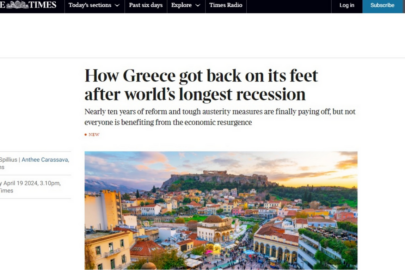Former PM and head of the Radical Left Coalition (SYRIA) party, Alexis Tsipras, addressed the Vellidis’ conference center in Thessaloniki. He presented his party’s program at Thessaloniki’s International Fair (TIF), a year after the program that was presented in 2014 that was largely responsible to catapulting him to power in the January 25 elections.
Back then he had promised to get rid of the bailouts for Greece once and for all, but now a great deal of water has passed under the bridge and Greece has sealed a third bailout that has been described by critics as the harshest yet. The SYRIZA leader said that the deal struck with creditors in July leaves scope to substitute some harsh fiscal measures with other policies that would achieve the same fiscal targets.
“We have compromised but we have not been compromised,” he said in reference to the bailout agreement that led to a split in SYRIZA soon after it was signed. “We decided to put the country over our party.”
The program he presented on Sunday relies on three pylons:
1. Reinstating liquidity and modernizing the insitutional framework for investments
2. Reinforcing the orientation of the agricultural sector
3. Implementation of a plan for social economy
How liquidity will be reinstated:
* Recapitalization of the bank system to be completed by January 1, 2016
* The new National Strategic Reference Framework with a doubling of downpayments for the new program period
* Creation of a new investment bank
* Exploitation of a new development program presented by European Commission President Jean-Claude Juncker
* Funding via a deal with the EBRD, the activation of the investment branch of the World Bank and a new deal with the European Investment Bank
Restructural changes
* Simplification of licensing for businesses
* Creation of a center to serve businesses
* Price reduction through the re-examination of the operation of the competitiveness committee and restructuring certain sectors where there are oligopolies, such as retail trade and fuel
* Upgrading the institutional framework to attract immediate foreign investment
* Modernization of the design for licensing and control of development by creating the environment for an equitable system for citizens and investments
* SMEs will be eased when looking for collaborations beyond Greek borders
* Increasing the research framework at Greek universities
* New forms of collaboration in the agricultural sector geared towards enterpreneurship
* Private investment that respect workers law
* New social businesses that will be created once the new institutional framework is completed
Agricultural Economy
* Protecting agricultural income
* Giving back farmers their market share from the value of their products, supporting co-ops, institutionalizing agricultural production etc.
* Restructuring public services and agricultural policy institutions with the local production-consumption network
* Transparency in production as far as social subsidies and agricultural development programs are concerned
* Improving food adequacy of Greece with specific plans linked to production
Social Economy
* The unification of scattered legislation to bring together local networks concerning the social economy
* An institutional framework for the transfer of businesses undergoing businesses back to production with viability plans
* Creating a Social Economy Fund that gathers money from administrative sanctions, donations, sponsorships and EU funds
Supporting the social state
1. Fighting the humanitarian crisis
2. Reducing unemployment
3. Protecting and upgrading health and welfare
4. Supporting the democratic restructuring of the education system





































